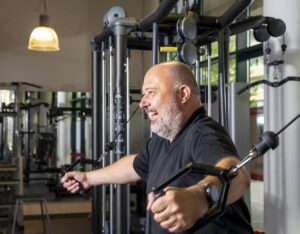In our fast – paced world, where constant demands and responsibilities seem to be a society norm, burnout has become a prevalent issue affecting many individuals. But what actually is burnout? It’s a state of chronic physical and emotional exhaustion which results from prolonged exposure to stressors such as work pressure, personal responsibilities, or even social demands. It affects not only our mental wellbeing but also has a significant long-term impact on our physical health.
How do I know if I am burnt out?
It is important to remember that experiencing a few of the signs below intermittently does not necessarily indicate burnout. However, constantly identifying with several symptoms over extended time periods may indicate burnout and that you should prioritize self care and seek support.

- Physical exhaustion: Feeling constantly drained, fatigued and lacking energy even after adequate rest of sleep.
- Emotional exhaustion: emotionally drained, overwhelmed and detached with everyday tasks and responsibilities.
- Decreased immunity
- Lack of motivation or interest in activities that were previously enjoyable or feeling ‘stuck in a rut’.
- Cognitive difficulties such as impaired concentration, memory and decision making.
- Increased irritability: a short fuse and reduced tolerance for minor stressors or inconveniences. Feeling snappy or agitated towards others.
- Withdrawn and isolated
- Neglected self-care practices such as healthy eating, washing, exercise and sleep.
- Reduced productivity
- Mood swings, anxiety or feelings of hopelessness.
- Interpersonal difficulties: strained relationships with family, colleagues, friends or relationships due to irritability, exhaustion and lack of engagement.
Exercise for Self-care
Now practicing self-care is often thought of as putting on a face mask and having a cup of tea in a bubble bath, and whilst this is also important, there are many other overlooked ways we can make a lasting and long term positive impact on our wellbeing.

Exercise has long been recognised as a powerful tool to improve physical fitness and prevent various health conditions. However, its impact on mental health and burnout is equally remarkable. Below is how exercise can serve as an effective antidote to burnout!
- Stress reduction: Exercise acts as a natural stress reliever by triggering the release of endorphins, commonly known as “feel-good” hormones. Physical activity stimulates the brain to produce these chemicals, which help reduce stress, boost mood, and promote overall well-being. Engaging in activities like jogging, swimming, or yoga can provide a temporary escape from the stressors of daily life, allowing your mind to find solace and recharge.
- Enhanced Sleep Quality: Quality sleep is essential for maintaining a healthy mind and body. Prolonged stress and anxiety can disrupt sleep patterns, leading to insomnia or poor sleep quality. Regular aerobic and muscle strengthening exercise has been proven to improve sleep by promoting the production of serotonin, a neurotransmitter that regulates sleep-wake cycles. It can also help to improve our sleep quality when we do get to sleep. By incorporating exercise into your routine, you can establish a healthier sleep pattern, ensuring your body receives the rest it needs to recover and rejuvenate.
- Mood Elevation: When experiencing burnout, it’s common to feel overwhelmed, irritable, or emotionally drained. Exercise acts as a natural mood booster by increasing the production of endorphins and neurotransmitters like dopamine and serotonin, which are associated with improved mood and reduced anxiety. Engaging in physical activity for as little as 10 minutes can provide a much-needed mental break, allowing you to regain clarity, reduce negative emotions, and restore emotional balance.
- Increased Energy Levels: Paradoxically, exercise can help combat fatigue and restore energy levels. Engaging in regular physical activity enhances cardiovascular fitness, improves muscle strength, and optimizes oxygen utilization by the body. As a result, you’ll experience increased stamina and endurance, allowing you to better cope with the demands of daily life. Regular exercise also improves overall metabolic function, enabling your body to efficiently convert nutrients into usable energy.
- Sense of Empowerment: Burnout often leads to feelings of helplessness and a loss of control over one’s life. Engaging in regular exercise can counteract these emotions by providing a sense of empowerment and self-efficacy. As you set fitness goals and work towards achieving them, you develop a belief in your ability to make positive changes and overcome challenges. This newfound confidence can spill over into other areas of your life, enabling you to regain control and tackle burnout head-on.

Incorporating exercise into your routine is a powerful strategy to combat burnout and nurture your overall well-being. By engaging in regular physical activity, you can reduce stress, improve sleep quality, elevate your mood, boost energy levels, and cultivate a sense of empowerment. However, it is important to pace yourself, and jumping suddenly headfirst into a daily 60-minute exercise program could make you feel a lot worse. Overtraining is a real thing! If you are seeking help to manage burnout symptoms, reach out for support on how to get the benefit of exercise long-term, or check out our blog on getting started!
Author: Maddie Warner, Accredited Exercise Physiologist




